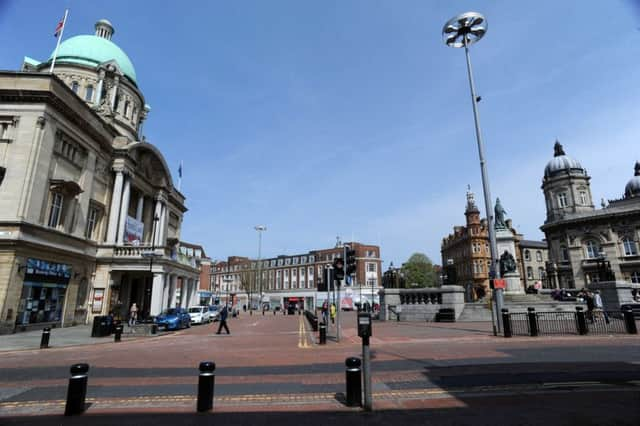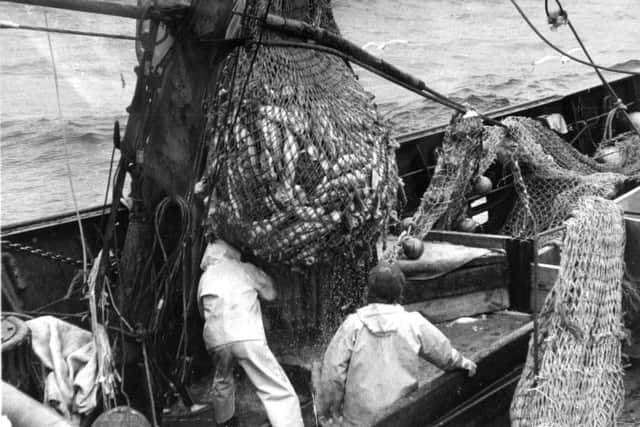How the city of Hull set out on road to recovery after horrors of the Cod War


Ever since trading first took place on the banks of the River Hull in the early 12th century, the fortunes of Yorkshire’s most easterly metropolis have been determined by maritime movements.
Advertisement
Hide AdAdvertisement
Hide AdIn more recent years, time has not been kind on Hull, which has fallen victim to events both offshore and inland that have been entirely out of its control, including the last Cod War that began 40 years ago this week.


However there are now encouraging signs that Hull’s luck is changing and that the tide is finally turning in the favour of a city which has endured more than its fair share of hardship.
Massive investment from companies like Siemens and Reckitts are creating thousands of jobs for both Hull and the wider East Riding and its designation as UK City of Culture for 2017 is beginning to put Hull on the map for the right reasons.
“We have been very unlucky down the years but this time things look very different,” said Hull Council’s Director of Regeneration, Mark Jones.
Advertisement
Hide AdAdvertisement
Hide Ad“The last Cod War coincided with a UK-wide recession caused by the oil crisis so there was little investment coming into the city over the next few years.


“We didn’t feel the effects of the demise of the fishing industry for five or six years, by which point the rest of the UK was also in deep recession once more, so yet again we didn’t get any assistance from central Government.
“The end of the fishing industry ‘only’ cost 15,000 jobs, the same as four coal mines or a couple of steelworks, so London didn’t see fit to provide extra aid for Hull.”
The western world’s most recent economic stagnation also coincided with the end of Yorkshire Forward’s regional funding programme, which resulted in many planned investment programmes in Hull failing to materialise.
Advertisement
Hide AdAdvertisement
Hide AdWhile its struggle has flown below the radar of politicians in Westminster, the hardships and economic struggle has not gone unnoticed in a city which has endured some of the worst levels of child poverty in Western Europe, higher than average unemployment and some of the lowest average weekly wages in the UK.
Ten years ago Hull city centre was a grim place to be: it was not just the facades of buildings that appeared dilapidated; many shoppers and workers had a beaten look about them.
All that is now changing as part of a programme of initiatives that are seeing Hull grow from within using a potent mixture of private and public finance that is transforming both how the city looks and feels.
“Because under-investment has been so stark in the last 40 years we haven’t been able to reinvent ourselves like other industrial centres,” said Mr Jones.
Advertisement
Hide AdAdvertisement
Hide Ad“Mines, steelworks and factories have all gone in other towns and cities but the port is still here and that gives us a wonderful focal point from which to build.”
Hull’s geographical location has created challenges, not least in the brain drain that has forced generations of bright young talent to move elsewhere to achieve success, but the city’s leaders are also aware that that isolation also comes with exciting opportunities.
The UK’s de-industrialisation and an increased mobility of labour have combined to erode the strong sense of community that was a feature of many Northern towns but Hull’s population has remained largely stable, resulting in an enviable level of social cohesion.
Most of the people who lived through the bad times in Hull remain and are so far showing an enthusiastic readiness to play their part in the reinvention of the city.
Advertisement
Hide AdAdvertisement
Hide AdCouncil leader Coun Stephen Brady said: “There’ a genuine sense of community here. Hull may be a big city but it has retained a village feel. We have to make that work for us.
“We all know what we are capable of and as more of us buy into this exciting journey our ambitions are becoming limitless.
“In 2011 we sat down as a council and decided that we had to turn things around by doing something very, very positive. The first thing we did was to set up the City Leadership Board which included major businesses, councillors and the education sector to help us realise our goal of creating 7,500 jobs over the next 10 years.
“To assist that we put together a plan to tackle unemployment, the lack of job opportunities and the skills gap that existed in Hull.
Advertisement
Hide AdAdvertisement
Hide Ad“One of the Leadership Board’s first decisions was to submit a bid to become City of Culture. Some people in the city shook their heads; many people outside the city just laughed at us.
“The bookmakers had us as 14-1 outsiders but we ended up winning.”
The chairman of the City of Culture selection panel, Phil Redmond said that Hull had put forward an irresistible bid based on it being a city “coming out of the shadows.”
Within a year of winning City of Culture designation for 2017, Hull appointed Martin Green, who had previously been head of ceremonies at London 2012 and the mastermind behind Yorkshire’s Grand Depart the following year, as Chief Executive of a dedicated team which has so far impressed council leaders.
Advertisement
Hide AdAdvertisement
Hide AdCoun Brady went on: “It’s going really, really well. They are a very strong team who are doing some fantastic work by establishing partnerships with the people of Hull, the business community and organisations like the BBC, who have given a commitment to work with us in local schools over the next few years.
“There is already a different feeling in Hull. We still have more than our fair share of problems which funding cuts by central Government aren’t helping but this is now a vibrant, positive city.”
Read more...